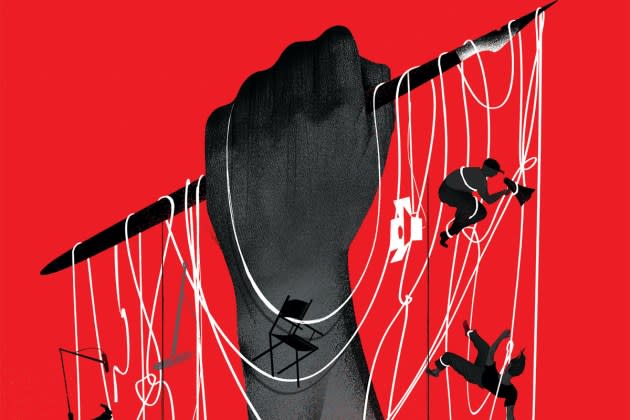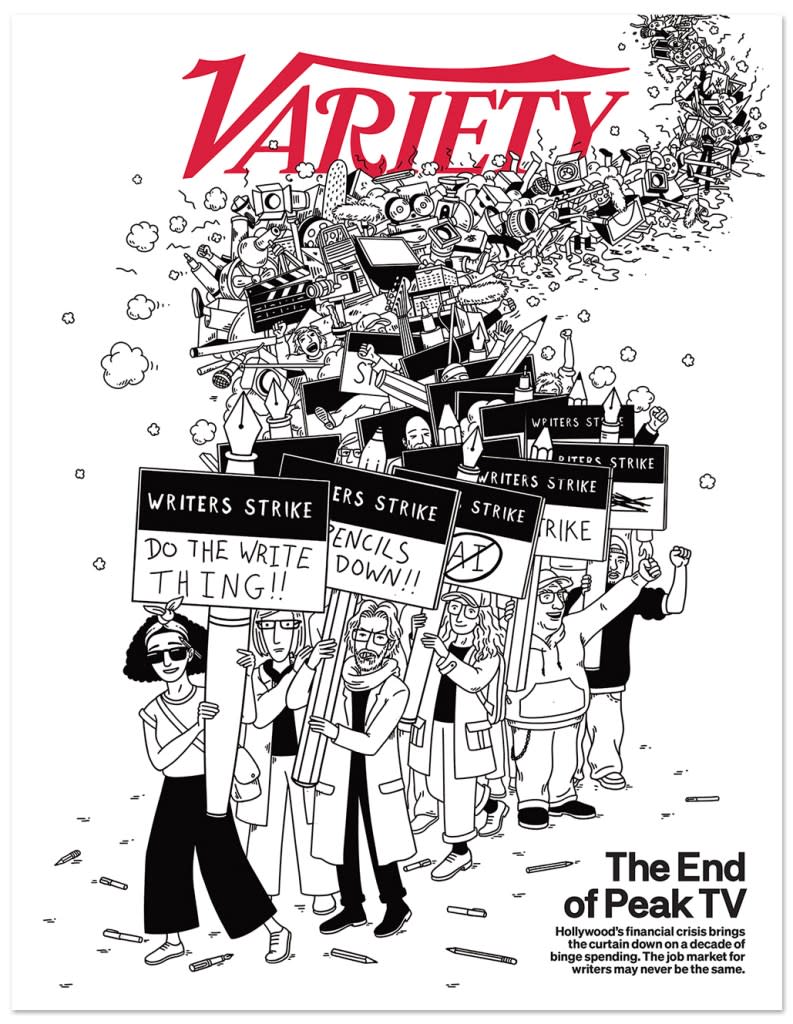A Bare Market? Once the Strike Is Settled, TV Jobs Could Become More Competitive as Hollywood Cuts Costs

When the clever signs are put away and the days of themed pickets are over, Hollywood’s writers will go back to work. But to what kind of job market will they return?
Based on conversations with a dozen sources across different segments of the industry, the prediction is that writers outside of A-level showrunner status will find a tighter employment picture as content spending slows at top networks and platforms. And even A-level showrunners will return to a markedly changed environment from recent years when Ryan Murphy, Shonda Rhimes, Greg Berlanti and a handful of others made headlines by striking nine-figure contracts. At a moment when cost-conscious studios are about to swing the force majeure ax to eliminate expensive production deals and save on overhead, the question of ROI, or the quality and quantity of content delivered, will be carefully considered.
More from Variety
'Fall of the House of Usher' Rails Against AI Writing Movies and TV Shows
How SAG-AFTRA Talks Collapsed: 'I Was Taken Completely By Surprise,' Union Chief Says
RELATED: If SAG-AFTRA Goes Out, How Fast Will WGA Go Back in to Negotiations With AMPTP?
After a decade of staggering growth in series production, the Great Contraction was destined to hit the creative community. The Writers Guild of America strike that began May 2 has accelerated the pace of the pruning of content and deals, but the driving force is less the work stoppage and more Hollywood’s reckoning with the changing economics of streaming.

Given all these factors, FX chief John Landgraf’s long-standing prediction of a major contraction in the number of scripted shows in the marketplace will finally come to pass. One talent agency partner who spoke with Variety said he expects to see an immediate 10% drop from 2022’s record-high 599 scripted series produced by major U.S. outlets. The volume drop will continue on “a downward trend until stock prices have turned around in the media sector,” he added.
Insiders candidly admit that a reduction in the overall number of series produced each year is not a bad thing for the biz. “I think it’s necessary,” another top tenpercenter observes. “There’s good stuff that doesn’t get seen and doesn’t get marketed. And then of course there’s just so much garbage.”
Exacerbating the compensation issue for writers is that episode counts have been reduced dramatically in the streaming era compared with the old days of broadcast television, when one season would consist of 22-24 episodes. Now, an eight- to 10-episode season is largely the standard; some series produce even less per season. Writers are paid by the episode, which means that the drop in standard season episode counts hits scribes in the pocketbook. It’s highly unlikely that premium TV outlets will return to a 22-episode standard. And that means competition for writing slots on fewer shows will be intense — a fear that is at the heart of the WGA’s contract demands at a pivotal moment for TV.
Another area where the streamers and studios will surely make deep cuts once the WGA dust settles is the overall deal market. Netflix upped the ante with its mega showrunner deals. Other platforms soon followed suit, with big names like Seth MacFarlane, Taylor Sheridan, David Benioff and D.B. Weiss and Phoebe Waller-Bridge signing multiyear deals with eye-popping price tags.
But fast forward to 2023, and many of those deals have not paid off. While some have managed to produce massive hits, others have produced hardly anything at all. It is not always cut and dried and the pandemic created many hurdles, such as when Mike Schur landed a series order for a “Field of Dreams” series under his deal at Universal Television only for it to be scrapped at Peacock. With a big-money deal comes high value expectations, and if companies are looking to reduce costs, cutting back even more on such deals is one way to do so.
No one is feeling the pinch of strike-related production delays more acutely than the broadcast networks, whose fall schedules have all heavily shifted to reality and alternative programming as the strike has upended any chance of getting scripted shows back by September.
“Once this stuff kind of takes over your schedule, it’s hard to wind that back,” a former broadcast executive says. “And the finance people see that and they start saying, ‘Well, why are we paying so much for 22 episodes every year when we can just do a slate of alternatives that’s much cheaper and delivers about the same number?’”
Broadcast networks have been ordering fewer scripted shows for some time, with this year’s pilot season yielding just five series orders to date in addition to two straight-to-series orders at Fox. A few pilots remain in contention, but gone are the days of dozens of new shows getting picked up across the five networks.
The former executive says that he still sees a future for scripted on broadcast, but that it will continue to be much narrower. “The irony is they are the best jobs for writers, given the episode count and residual structure,” he adds.
The fight for better residuals in the streaming space is a major point of focus for the WGA, and sources say that is an area where the writers could make some real gains. As streamers move more and more toward an AVOD model in which ratings information will become transparent, writers and their agents will hopefully have greater leverage to negotiate deals with studios and streamers.
“Advertisers want more stability and regularity,” says J.D. Connor, an associate professor of cinematic arts at USC. “And they aren’t necessarily as afraid of that cost escalation as Seasons 3 and 4 come along. So my sense is that change will make it easier for writers and actors to get some return to a more traditional backend like we used to have in a world of broadcast and cable dominance.”
But advertisers won’t necessarily want their ads running alongside some of the content currently available to stream, which leads both the agency partner and the top TV lit agent to speculate there will be a renewed push toward traditional broadcast formats on streaming, such as sitcoms and episodic procedurals.
“There’s going to be a renewed focus on content that can sustain advertisers, meaning not ‘Euphoria’ or ‘The Idol,’” the partner says. “There’s obviously going to continue to be a massive place for premium content, but we’re going to have to get back to prioritizing shows that Johnson & Johnson can fucking stomach.”
“Premium” has been a defining word in TV for the past decade. Ever since “Game of Thrones” redefined what was possible in television, episodic budgets have skyrocketed, with numerous shows now costing upwards of $20 million an episode.
Given some recent high-cost misfires, like Amazon’s “Citadel,” the widespread expectation is that these expensive shows will become even more of a rarity.
“Financial discipline is going to have to come into play,” says the agency partner.
Another agency partner says that he imagines that mega-overall deals will become much scarcer, only being offered to creators with established machinery capable of turning around shows at a good pace, like Rhimes and Murphy. Or perhaps there will be more deals like that of Berlanti, one of the most prolific producers working today, whose new pact with Warner Bros. will reportedly see him compensated based on the success of the shows he produces, as with the broadcast and cable model.
The longer the strike continues, the more drastic certain cuts no doubt will be. One high-ranking studio executive worries that a protracted strike will lead to a “Pyrrhic victory” for both the writers and the studios.
“I fear that we’re in this battle right now, the AMPTP and the writers, and we will come back after the strike and we will have both lost the war,” she says. “Our business will have shrunken. …The longer this goes, the less there is to come back to.”
Jennifer Maas contributed to this story.
Best of Variety
'House of the Dragon': Every Character and What You Need to Know About the 'Game of Thrones' Prequel
25 Groundbreaking Female Directors: From Alice Guy to Chloé Zhao
Sign up for Variety’s Newsletter. For the latest news, follow us on Facebook, Twitter, and Instagram.


